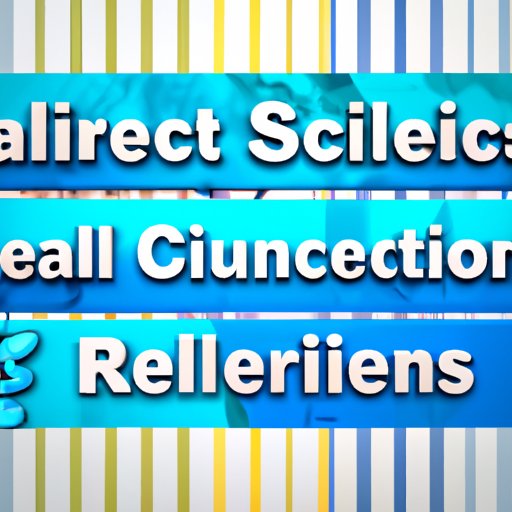Introduction
Allied health sciences is a broad term used to describe a wide range of healthcare professionals, including audiologists, physical therapists, occupational therapists, dietitians, speech-language pathologists, respiratory therapists, and more. These professionals provide essential services to patients in hospitals, clinics, and other healthcare settings.
Overview of Allied Health Sciences
The term “allied health” refers to a wide range of healthcare professions and occupations. According to the American Association for Medical Assistants (AAMA), “Allied health professionals are those who provide direct patient care or support services related to patient care, but are not physicians or nurses. They are an integral part of the healthcare team and provide services that are vital to the delivery of quality healthcare.”
The scope of allied health sciences is vast, encompassing many different types of healthcare professionals. These professionals work in a variety of settings, such as hospitals, clinics, long-term care facilities, home health agencies, and private practices. They also play a crucial role in providing preventive care, diagnosis, treatment, and rehabilitation services to patients.

Exploring the Different Types of Allied Health Sciences Careers
There are many different types of allied health sciences careers available to individuals who are interested in pursuing a career in healthcare. Some of the most popular allied health professions include physical therapy, occupational therapy, speech-language pathology, audiology, nutrition, and respiratory therapy.
Each of these professions has its own unique set of education requirements, job responsibilities, and licensing requirements. Depending on the profession, individuals may need to obtain a bachelor’s degree, master’s degree, or doctoral degree from an accredited college or university.
In addition to formal education requirements, each allied health profession has its own set of job responsibilities. Physical therapists help people recover from injuries or surgeries, while occupational therapists assist individuals with disabilities to develop skills that will improve their daily functioning. Speech-language pathologists help people communicate effectively, while audiologists diagnose and treat hearing disorders. Nutritionists and dietitians help people make healthy food choices, while respiratory therapists provide treatments to people with respiratory illnesses.

What it Takes to Become an Allied Health Professional
In addition to meeting the educational requirements for their chosen profession, individuals must also possess certain skills and knowledge to become successful allied health professionals. According to a study published in the journal Allied Health Careers, “Successful allied health professionals must have excellent communication and interpersonal skills, be highly organized, and be able to work independently and as part of a team.”
In addition to having the necessary skills and knowledge, individuals must also meet the licensing and certification requirements for their chosen profession. Depending on the state, individuals may need to complete a certain number of hours of supervised practice and pass an exam in order to obtain a license or certification. It is important to research the licensing requirements for your chosen profession before beginning your career.

A Closer Look at the Benefits of a Career in Allied Health Sciences
A career in allied health sciences offers many benefits, both financial and otherwise. The financial rewards of a career in this field can vary depending on the profession, but most allied health professionals can expect to earn a comfortable salary. According to the Bureau of Labor Statistics, the median salary for physical therapists was $89,440 in 2019.
In addition to the potential for financial rewards, a career in allied health sciences also offers job security. The demand for allied health professionals is expected to continue to grow in the coming years. In fact, the Bureau of Labor Statistics projects that the employment of physical therapists will increase by 22 percent from 2019 to 2029.
Finally, a career in allied health sciences offers individuals the opportunity to gain a variety of experiences. Working in this field gives individuals the chance to work with different types of patients, learn new skills, and explore different areas of healthcare.
The Future of Allied Health Sciences: Trends and Predictions
The future of allied health sciences looks bright. According to a recent report from the National Center for Health Workforce Analysis, “The U.S. healthcare system is projected to experience growth in the number of allied health professionals over the next decade.”
In addition to the growth of the industry, technological advances are also expected to impact the field of allied health sciences. For example, telehealth is becoming increasingly popular, allowing allied health professionals to provide services remotely. Additionally, the use of artificial intelligence and machine learning is becoming more common, allowing allied health professionals to provide more efficient and effective care.
Finally, new opportunities are emerging in the field of allied health sciences. For example, some allied health professions are now offering specialized certifications, such as gerontology or wound care. Additionally, new technologies, such as 3D printing, are being used to create prosthetic devices, providing new opportunities for allied health professionals.
Conclusion
Allied health sciences is a broad field that encompasses a variety of healthcare professions. Individuals who are interested in pursuing a career in this field can expect to find a variety of career opportunities, ranging from physical therapy to speech-language pathology. They can also expect to gain a variety of experiences, enjoy financial rewards, and benefit from job security. Additionally, the field of allied health sciences is expected to continue to grow in the coming years, with new opportunities emerging as technology advances.
(Note: Is this article not meeting your expectations? Do you have knowledge or insights to share? Unlock new opportunities and expand your reach by joining our authors team. Click Registration to join us and share your expertise with our readers.)
